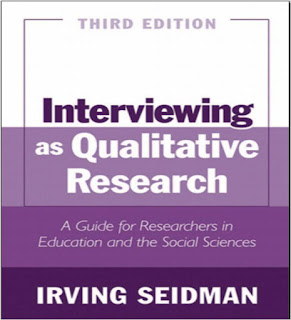Interviewing as Qualitative Research by Irving Seidman
This book is intended for doctoral candidates who are engaged in that search and who think that in-depth interviewing might be appropri-ate for them and their research topic. It will also serve more experienced researchers who are interested in qualitative research and may be turning to the possibilities of interviewing for the first time. Finally, the book is geared to professors in search of a supplementary text on in-depth inter-viewing that connects method and technique with broader issues of qualitative research. For both individual and classroom use, the book provides a step-by-step introduction to the research process using in-depth inter-viewing and places those steps within the context of significant issues in qualitative research. The text centers on a phenomenological approach to in-depth in-terviewing. The Introduction outlines how I came to do interviewing research. Chapter 1 discusses a rationale for using interviewing as a research method and the potential of narratives as ways of knowing. Chapter 2 presents a structure for in-depth, phenomenologically based interviewing that my associates and I have used in our research projects. The text provides specific guidance on how to carry out this ap-proach to interviewing and the principles of adapting it to one’s own goals. Chapter 3 explores issues that may make proposal writing daunt-ing and discusses meaningful but simple questions that can guide the researcher through the process. Chapter 4 stresses pitfalls and snares to avoid in the process, and discusses issues in establishing access to, mak-ing contact with, and selecting participants. Chapter 5, responding to the increasing concern about ethical issues in interviewing research, intro-duces the Institutional Review Board (IRB) process and its implications for researchers who interview. This chapter explains the risks inherent in interviewing research that lead IRBs to require Informed Consent Forms. The chapter explicates the major points that an informed con-sent form should include, alerts readers to corresponding ethical issues.............
Note: "This download page will direct you to skip advertising shorte.st. Basically when the page loads the site shorte.st. with various advertisements, the add-on does go directly to the site you want, kindly be patient waiting a few seconds to skip the add-on". Thank you ~ by Admin





















































